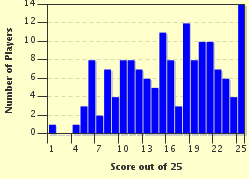Quiz Answer Key and Fun Facts
1. The letter 'A' is for 'Andrew'. According to John 12:20-22, Andrew helped lead a foreign delegation to a meeting with Christ. Where was the group from?
2. The letter 'B' is for 'Beatitudes'. One of the disciples quoted Jesus extensively when He gave the message known as the Beatitudes followed by the Sermon on the Mount. In fact, the disciple provided so many extensive quotes many believe he knew a form of shorthand. Who was the disciple?
3. The letter C is for 'Cash'. As per John 12:6 and 13:29, which one of the Twelve Disciples was responsible for looking after the money used for Christ's ministry?
4. The letter D is for 'Denial'. Which disciple boldly proclaimed he would NEVER deny Christ, as per Mark 14:30, only to do an abrupt U-turn a few hours later and deny even knowing Him on three different occasions?
5. The letter E is for 'Execution'. Tradition holds that all the disciples were eventually executed with the exception of John. According to Scripture, who was the first disciple to be executed? (Acts 12:1-2)
6. The letter F is for 'Fish' as in a fish with a coin in its mouth. Which disciple was instructed by Jesus to go fishing and told the first fish he would land would contain a coin in its mouth to pay an obligatory temple tax? (Matthew 17:24-27)
7. The letter G is for 'Greek'. Out of the four choices below, which disciple had a Greek name?
8. The letter H is for 'Household.' Not much is known about the disciples and their families and the type of households they lived in before meeting Jesus. However, Scripture does give some fleeting glimpses of their families and tells us the name of Judas Iscariot's father. What was his name, as per John 13:26?
9. The letter I is for 'Impulsive'. Which disciple is BEST KNOWN for being impulsive, acting without thinking things through?
10. The letter J is for 'John the Baptist'. According to John 1:40, which man was a disciple of John the Baptist before becoming one of the Twelve Disciples of Christ?
11. The letter K is for 'Kiss'. Which disciple kissed Jesus just prior to his arrest in the Garden of Gethsemane?
12. The letter L is for 'Love'. Going by TRADITION, who was the disciple Jesus loved?
13. The letter M is for 'Malchus' who had his ear cut off in the Garden of Gethsemane. According to John 18:10, who drew the sword that cut off his ear?
14. The letter N is for 'Nathanael'. He was the first to proclaim Jesus as the Son of God.
15. The letter O is for the 'Only One'. At the crucifixion, all the disciples fled, with the exception of one. According to TRADITION, who was the one disciple who stayed with Christ to what at that time, appeared to be the very end?
16. The letter P is for 'Perfume'. What disciple was indignant that a woman used expensive perfume to anoint Christ's feet?
17. The letter Q is for 'Quiet'. Out of the names of the Twelve Disciples below, which two disciples were quiet and not quoted at all in Scripture?
18. The letter R is for 'Recruitment'. Which man was recruited to become a member of the Twelve Disciples by Philip? (John 1:43-51)
19. The letter S is for 'Sleep'. What three disciples fell asleep on three different occasions in the Garden of Gethsemane while Jesus were fervently praying before His crucifixion? (Matthew 26:36-45)
20. The letter T is for 'Twin'. Which disciple is believed to have been a twin?
(John 11:16)
21. The letter U is for 'Unbelief'. Which one of the Twelve Disciples initially refused to believe reports about the resurrection of Jesus? (John 20:24-29)
22. The letter V is for 'Victorious'. Going by TRADITION, which disciple was victorious in beating Peter in a footrace to Christ's empty tomb, as per John 20:4?
23. The letter W is for 'Wife'. Of the Twelve Disciples, which one can we be certain about when we say he was married? (Luke 4:38-39)
24. The letters X and Y are for the 'Youngest'. Going by Scripture, which one of the Twelve Disciples was the youngest?
25. The letter Z. What two members of the Twelve Disciples were the sons of Zebedee?
Source: Author
Cowrofl
This quiz was reviewed by FunTrivia editor
agony before going online.
Any errors found in FunTrivia content are routinely corrected through our feedback system.

